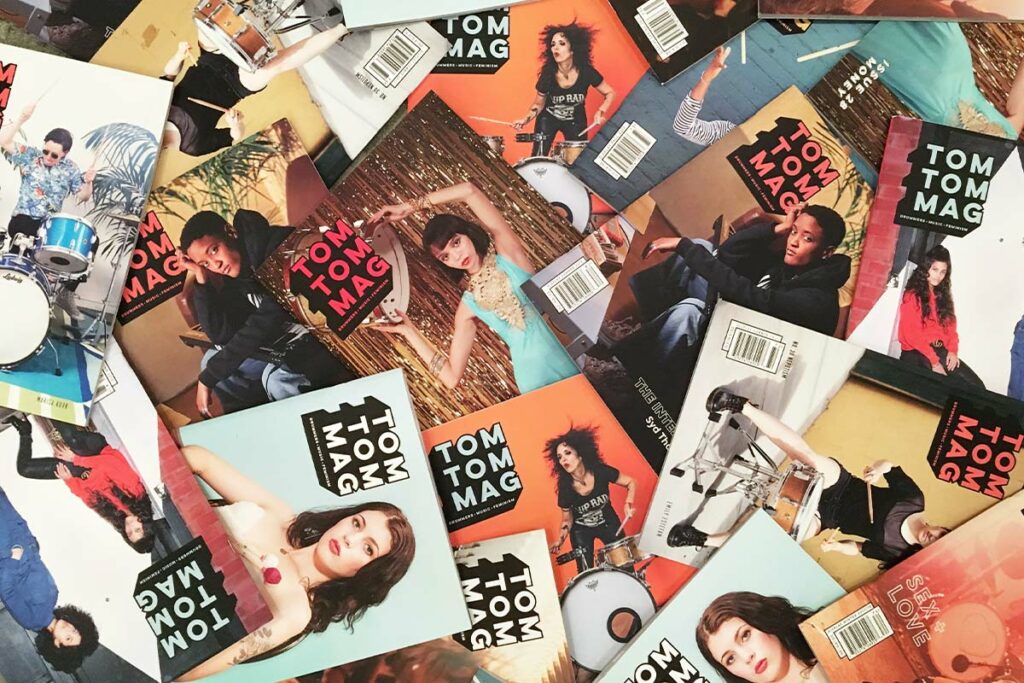
Ten years ago, drummer and drum machine programmer Mindy Abovitz-Monk typed “female drummer” into Google’s search bar. The results were sad.
“Everything from bikini-clad women standing next to drum sets, to articles about whether or not women could play drums was about her only choices when it came to something that she was passionate about, but nothing substantial or meaningful was to be found,” writes Samir “Mr. Magazine” Husni. “So, she decided to do something about it. And that was eventually to start her own brand; her own movement.”
Abovitz-Monk had been working in the music industry for about 10 years at that point and knew that female drummers weren’t getting the respect or attention they deserved. That didn’t sit well with this self-described feminist, so she set about changing the dialogue.
“I started a blog with the sole intention to change Google search results around ‘female drummer,’ ‘woman drummer,’ and ‘girl drummer,’ and that very quickly evolved into a website, events, and then within one year, a print magazine focusing on female drummers, beatnikers, and producers, essentially just to give credibility and a home to the women of the past, present and future who were and are going to be drummers, and who didn’t really have a home until then” Abovitz-Monk told Husni.
She had no intention of becoming a magazine publisher at the outset but was convinced by talking to her followers (what we cann the audience-first approach around here.)
And it was really not my decision, it was the people who were already coming to our parties and the people who were looking at our website and really wanted to see our content in print and I really had no idea what that was going to do to my life and how it was going to change everything,” she told Husni. “But I agreed to do print because I felt like you couldn’t ignore print; you can’t ignore print, it’s an object. And I knew that we were going to make the print quality as high as we could. And we were going to design it really well. So, I figured we would get a lot of respect, that female drummers would get a lot of respect, once we had a print object. More so than if it was just digital.
“…you can’t ignore print, it’s an object.”
For the record, she’s absolutely right about that; print magazines continue to be ranked tops in trust, respect and credibility. The platform of “real” beats digital in any market niche.
Thirty-five issues later, the “business” of print publishing remains a challenge (it’s never been a field for sissies) but Abovitz-Monk has found the journey enlightening and worthwhile.
“Distribution and essentially every conversation that you might imagine a business owner having was for the most part challenging and then rewarding,” she explained. “Challenging in that I was pressed to convince people that female drummers are not a niche, we are a viable customer to speak to. And then rewarding when people came around and agreed and actually gave us a chance, opened their doors and let us perform. Larger companies invested in us overtime and that made it all worthwhile.”
Out of her perseverance, she’s expanded her platform in incredible ways, even landing an exhibit at MOMA PS1 in Queens.
“I put a proposal together, it was a total stab in the dark,” she said. “I didn’t think that they would agree and they did. And I think that allowed me to broaden my horizons and to realize that we were going to reach people outside of just the music industry. And that the art world saw value in us, by valuing us as the female drummer and also in me as an owner of this magazine and as someone who can use different platforms to articulate a similar message. And that platform was their museum. So, that was an incredible moment for me.”
Has it all worked to meet her original mission? A quick Google search on female drummers shows an entirely different result than Abovitz-Monk found 10 years ago. She didn’t do it single-handedly, but she is keenly aware of Tom Tom’s role as a catalyst for change.
“I don’t have the statistics in front of me, but there’s Tom Tom Magazine, which I started; there’s Hit Like a Girl, which I co-founded, which is a female drummer contest that’s global and based online,” she notes. “She Shreds Magazine started because of Tom Tom and loads of other media companies and organizations kind of sprouted up and felt supported by us or felt inspired by us. And I think Tom Tom itself and all of the other companies that started up because of us has greatly affected the music industry and introduced many more girls and women to it. And they have given the women already there more confidence to stand up and promote themselves. And to ask for things, such as tour money, or whatever it might be.”
What a powerful testimony to both Abovitz-Monk’s clear vision and dedication to building a platform with a purpose. You rock on, Mindy.
